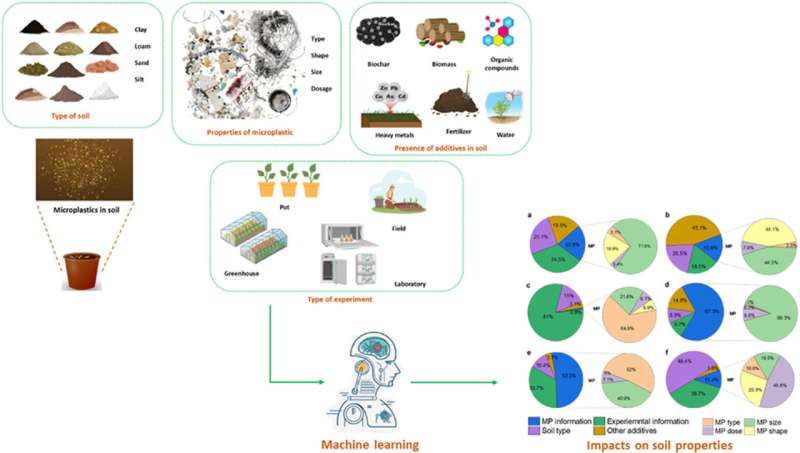This article has been reviewed according to Science X's editorial process and policies. Editors have highlighted the following attributes while ensuring the content's credibility:
fact-checked
peer-reviewed publication
proofread
AI predicts the influence of microplastics on soil properties

Plastic waste and its buildup in nature has become a major environmental concern in recent times. While plastic pollution in the oceans is undoubtedly a problem, the presence of plastics in soils around the world is also known to cause severe environmental and health issues.
As plastics fragment into smaller pieces known as microplastics (MPs) in the soil through natural and anthropogenic processes, they drastically alter soil properties. Moreover, they are also absorbed by plants, potentially entering human food chain and causing health complications.
Grasping the impact of MPs on soil properties bears significant relevance for corporate sustainability, notably within the "Environmental" aspect of Environmental, Social, and Governance (ESG) goals. Global corporations are often confronted with mounting expectations to embrace eco-friendly strategies, with a particular emphasis on handling plastic-related concerns being the core of these initiatives.
However, the underlying mechanisms governing the environmental impact of soil MPs still remain unknown. Soil-MP interactions are complex due to soil heterogeneity and MP diversity, challenging prediction and mitigation of their effects on soil properties.
To address this paucity in research on soil MPs, a team of scientists, led by Prof. Yong Sik Ok, used machine learning (ML) algorithms to assess and predict the influence of MPs on soil properties. Prof. Ok is a KU HCR professor, president of the International ESG (Environmental, Social and Governance) Association (IESGA), and the chair and program director of the Sustainable Waste Management Program for the Association of Pacific Rim Universities (APRU SWM Program).
"ML is a dynamic and transformative field of artificial intelligence (AI) that uses algorithms and models to learn and make predictions from vast datasets with great accuracy. Using ML to comprehensively understand the role of MPs in soil systems is time- and resource-efficient and provides a foundation for future research on this subject," explains Prof. Ok, the corresponding author of this study.
The results of their study were made available online on 5 November 2023 in Environmental Pollution, following Prof. Ok's two critical reviews published under the collection "Plastics in the Environment" in Nature Reviews Earth and Environment.
The ML algorithms were programmed to predict the influence of MPs on soil properties and found that different MP factors, such as type, size, shape, and dosage, significantly altered soil properties. Specifically, MP size was identified as a major factor that affects soil properties. Besides this, the shape, type, and dosage of MP was also found to distinctly influence the soils' chemical properties.
"This pioneering study contributes essential data to support informed decision-making on plastic waste management, aligning with the global focus on sustainability and ESG principles. It underscores the importance of innovative research in guiding corporate sustainability efforts, where plastic-related issues are a growing concern. The application of ML techniques to this problem demonstrates the potential for advanced technology to drive sustainable practices and create a greener, more eco-conscious future," says Prof. Ok.
These quantitative insights into the influence of MPs on soil characteristics represents a breakthrough in comprehending and mitigating the plastic waste dilemma. The study's utilization of ML algorithms marks a groundbreaking shift from traditionally complex and resource-intensive methods for predicting and interpreting the impact of MPs on soil properties.
"Our ML-based approach for this study underscores the potential of advanced technology to address the challenge of MP pollution in our environment. Such data-driven research could guide informed decision-making on plastic waste management, while aligning with global sustainability goals and the principles of ESG, social responsibility, and community engagement. Furthermore, this could revolutionize corporate sustainability efforts and pave the way for more green jobs and sustainable development to create a greener and eco-conscious world for current and future generations," says Prof. Ok.
Integrating ML insights to study the impact of MPs in the context of ESG aligns with social responsibility, fostering sustainable practices with positive community effects. Corporations tackling MP pollution can not only reduce their environmental footprint but also build community trust by applying ML solutions. These efforts could, in turn, influence industry standards, potentially creating jobs and driving economic growth in related fields.
"We have consistently addressed global threats posed by plastic pollution and the importance of soil ecosystems, exemplified by our contributions of three articles to Nature journals' groundbreaking special issues on 'Soils in Food Systems' and 'Plastics in the Environment,'" concludes Prof. Ok.
More information: Piumi Amasha Withana et al, Machine learning prediction and interpretation of the impact of microplastics on soil properties, Environmental Pollution (2023). DOI: 10.1016/j.envpol.2023.122833
Journal information: Nature , Environmental Pollution
Provided by Cactus Communications




















